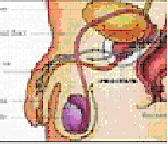


Prostate cancer happens when cells in the prostate begin to grow out of control and can then invade nearby tissues or spread throughout the body. Large collections of this out of control tissue are called tumors.
What is the Prostate?
The prostate is one of the male sex glands. The prostate adds nutrients and fluid to the sperm. During ejaculation, the prostate secretes fluid that is part of the semen. The other major sex glands in men are the testes and the seminal vesicles. Together, these glands store and secrete the fluids that make up semen.
The prostate is about the size of a walnut and can be divided into two parts referred to as the right or left lobes. It lies just below the urinary bladder and surrounds the upper part of the urethra. The urethra is the tube that carries urine from the bladder and semen from the sex glands out through the penis. As one of a man’s sex glands, the prostate is affected by male sex hormones. These hormones stimulate the activity of the prostate and the replacement of prostate cells as they wear out. The chief male hormone is testosterone, which is produced almost entirely by the testes.


Am I at risk for prostate cancer?
Although there are several known risk factors for getting prostate cancer, no one knows exactly why one man gets it and another doesn't. Some of the most important risk factors for prostate cancer include age, ethnicity, genetics and diet. Age is generally considered the most important risk factor for prostate cancer
î Every man over the age of 45 is at risk for prostate cancer.
î Prostate cancer can occasionally strike younger men.
î More than 70% of men diagnosed with prostate cancer are over the age of 65.
î The incidence of prostate cancer rises quickly after the age of 60.
î The majority of men will have some form of prostate cancer after the age of 80.
· Eat a low fat diet that is rich in fruits and vegetables.
· Eat vitamins and minerals such as selenium, lycopen, vitamin A and other retinoids, vitamin D, vitamin E, and soy.
· Using the drugs like Flutamide and Finasteride that are under investigation.
· Decrease the total amount of testosterone in the body.
· Always come to the hospital to get the medical treatment.
Risk factors
· Some of the most important risk factors for prostate cancer include age, ethnicity, family history, genetics, race and diet. Age is generally considered the most important risk factor for prostate cancer.
What Are the Treatment Methods?
The method selected to treat prostate cancer depends on its stage, speed of growth, and the general health of the patient. It is also important to consider the benefits and potential side effects for each treatment option that is available to you. All of these factors can and should be discussed thoroughly by you and your doctor. At the present time, certain choices are made more frequently than others for the treatment of each stage of prostate cancer.